Leadership and Management: Skills, Examples, and EI Test
VerifiedAdded on 2022/09/29
|8
|1802
|36
Essay
AI Summary
This essay delves into the core distinctions between leaders and managers within organizational settings. It explores the contrasting characteristics and responsibilities of each role, highlighting how leaders focus on future vision and inspire change, while managers concentrate on goal setting and risk mitigation. The essay provides a detailed comparison of leadership and management skills, supported by real-world examples such as Warren Buffet, Mahatma Gandhi, and a case of poor management. The analysis includes an emotional intelligence test, evaluating self-awareness, self-management, social awareness, and relationship management. The essay concludes by summarizing the key takeaways and emphasizing the importance of both effective leadership and management for organizational success, and the role of emotional intelligence in both.

MANAGEMENT
Paraphrase This Document
Need a fresh take? Get an instant paraphrase of this document with our AI Paraphraser
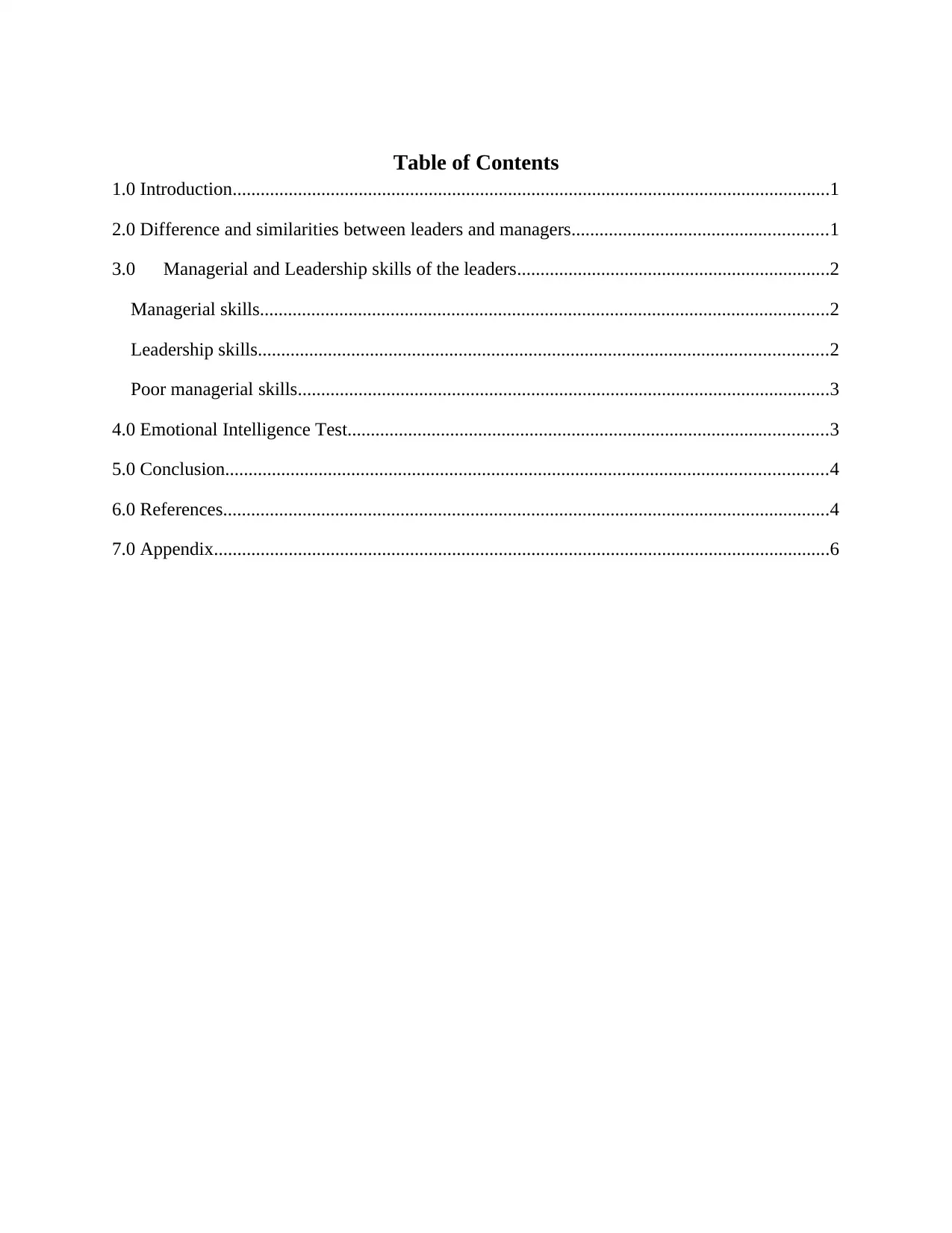
Table of Contents
1.0 Introduction................................................................................................................................1
2.0 Difference and similarities between leaders and managers.......................................................1
3.0 Managerial and Leadership skills of the leaders...................................................................2
Managerial skills..........................................................................................................................2
Leadership skills..........................................................................................................................2
Poor managerial skills..................................................................................................................3
4.0 Emotional Intelligence Test.......................................................................................................3
5.0 Conclusion.................................................................................................................................4
6.0 References..................................................................................................................................4
7.0 Appendix....................................................................................................................................6
1.0 Introduction................................................................................................................................1
2.0 Difference and similarities between leaders and managers.......................................................1
3.0 Managerial and Leadership skills of the leaders...................................................................2
Managerial skills..........................................................................................................................2
Leadership skills..........................................................................................................................2
Poor managerial skills..................................................................................................................3
4.0 Emotional Intelligence Test.......................................................................................................3
5.0 Conclusion.................................................................................................................................4
6.0 References..................................................................................................................................4
7.0 Appendix....................................................................................................................................6
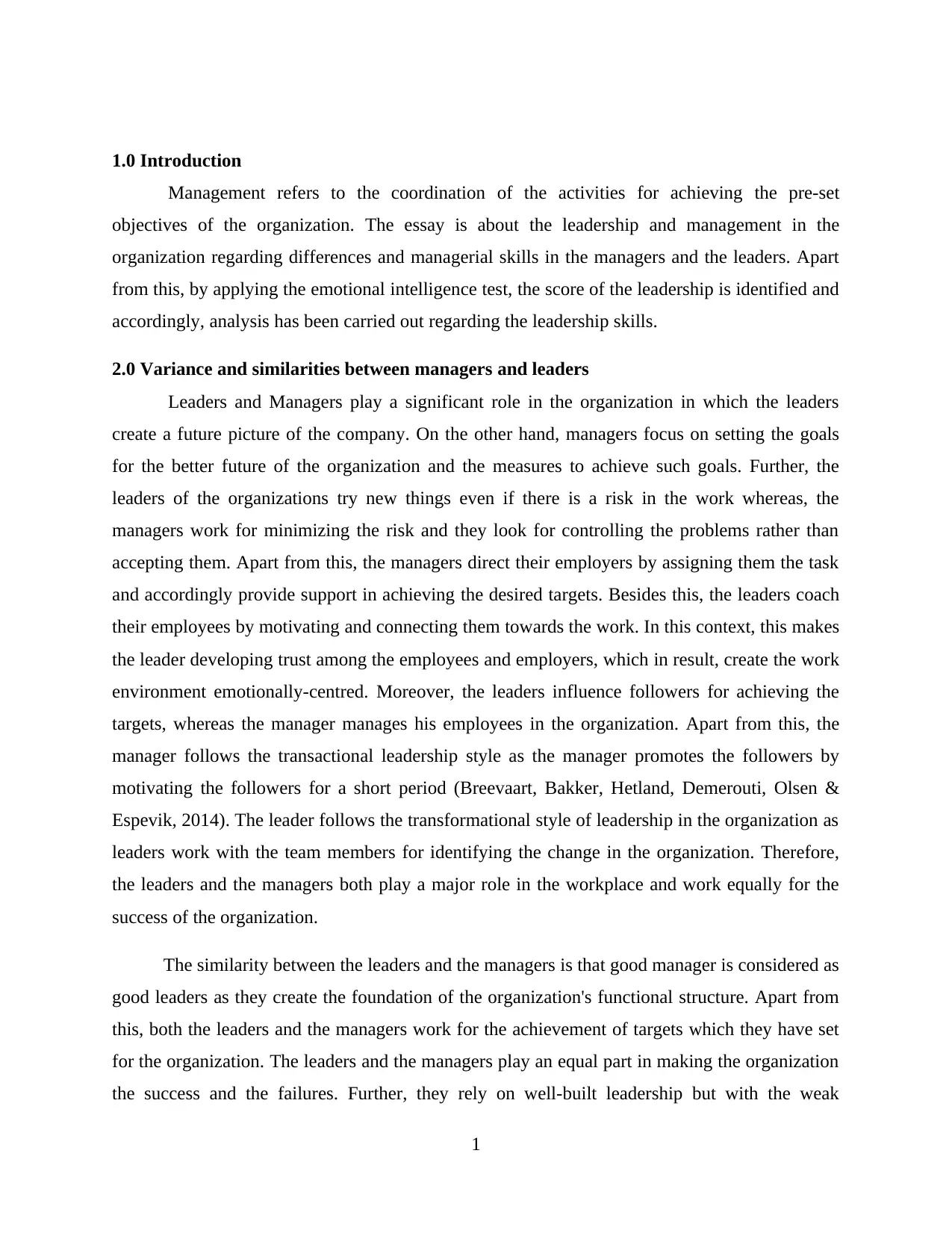
1.0 Introduction
Management refers to the coordination of the activities for achieving the pre-set
objectives of the organization. The essay is about the leadership and management in the
organization regarding differences and managerial skills in the managers and the leaders. Apart
from this, by applying the emotional intelligence test, the score of the leadership is identified and
accordingly, analysis has been carried out regarding the leadership skills.
2.0 Variance and similarities between managers and leaders
Leaders and Managers play a significant role in the organization in which the leaders
create a future picture of the company. On the other hand, managers focus on setting the goals
for the better future of the organization and the measures to achieve such goals. Further, the
leaders of the organizations try new things even if there is a risk in the work whereas, the
managers work for minimizing the risk and they look for controlling the problems rather than
accepting them. Apart from this, the managers direct their employers by assigning them the task
and accordingly provide support in achieving the desired targets. Besides this, the leaders coach
their employees by motivating and connecting them towards the work. In this context, this makes
the leader developing trust among the employees and employers, which in result, create the work
environment emotionally-centred. Moreover, the leaders influence followers for achieving the
targets, whereas the manager manages his employees in the organization. Apart from this, the
manager follows the transactional leadership style as the manager promotes the followers by
motivating the followers for a short period (Breevaart, Bakker, Hetland, Demerouti, Olsen &
Espevik, 2014). The leader follows the transformational style of leadership in the organization as
leaders work with the team members for identifying the change in the organization. Therefore,
the leaders and the managers both play a major role in the workplace and work equally for the
success of the organization.
The similarity between the leaders and the managers is that good manager is considered as
good leaders as they create the foundation of the organization's functional structure. Apart from
this, both the leaders and the managers work for the achievement of targets which they have set
for the organization. The leaders and the managers play an equal part in making the organization
the success and the failures. Further, they rely on well-built leadership but with the weak
1
Management refers to the coordination of the activities for achieving the pre-set
objectives of the organization. The essay is about the leadership and management in the
organization regarding differences and managerial skills in the managers and the leaders. Apart
from this, by applying the emotional intelligence test, the score of the leadership is identified and
accordingly, analysis has been carried out regarding the leadership skills.
2.0 Variance and similarities between managers and leaders
Leaders and Managers play a significant role in the organization in which the leaders
create a future picture of the company. On the other hand, managers focus on setting the goals
for the better future of the organization and the measures to achieve such goals. Further, the
leaders of the organizations try new things even if there is a risk in the work whereas, the
managers work for minimizing the risk and they look for controlling the problems rather than
accepting them. Apart from this, the managers direct their employers by assigning them the task
and accordingly provide support in achieving the desired targets. Besides this, the leaders coach
their employees by motivating and connecting them towards the work. In this context, this makes
the leader developing trust among the employees and employers, which in result, create the work
environment emotionally-centred. Moreover, the leaders influence followers for achieving the
targets, whereas the manager manages his employees in the organization. Apart from this, the
manager follows the transactional leadership style as the manager promotes the followers by
motivating the followers for a short period (Breevaart, Bakker, Hetland, Demerouti, Olsen &
Espevik, 2014). The leader follows the transformational style of leadership in the organization as
leaders work with the team members for identifying the change in the organization. Therefore,
the leaders and the managers both play a major role in the workplace and work equally for the
success of the organization.
The similarity between the leaders and the managers is that good manager is considered as
good leaders as they create the foundation of the organization's functional structure. Apart from
this, both the leaders and the managers work for the achievement of targets which they have set
for the organization. The leaders and the managers play an equal part in making the organization
the success and the failures. Further, they rely on well-built leadership but with the weak
1
⊘ This is a preview!⊘
Do you want full access?
Subscribe today to unlock all pages.

Trusted by 1+ million students worldwide
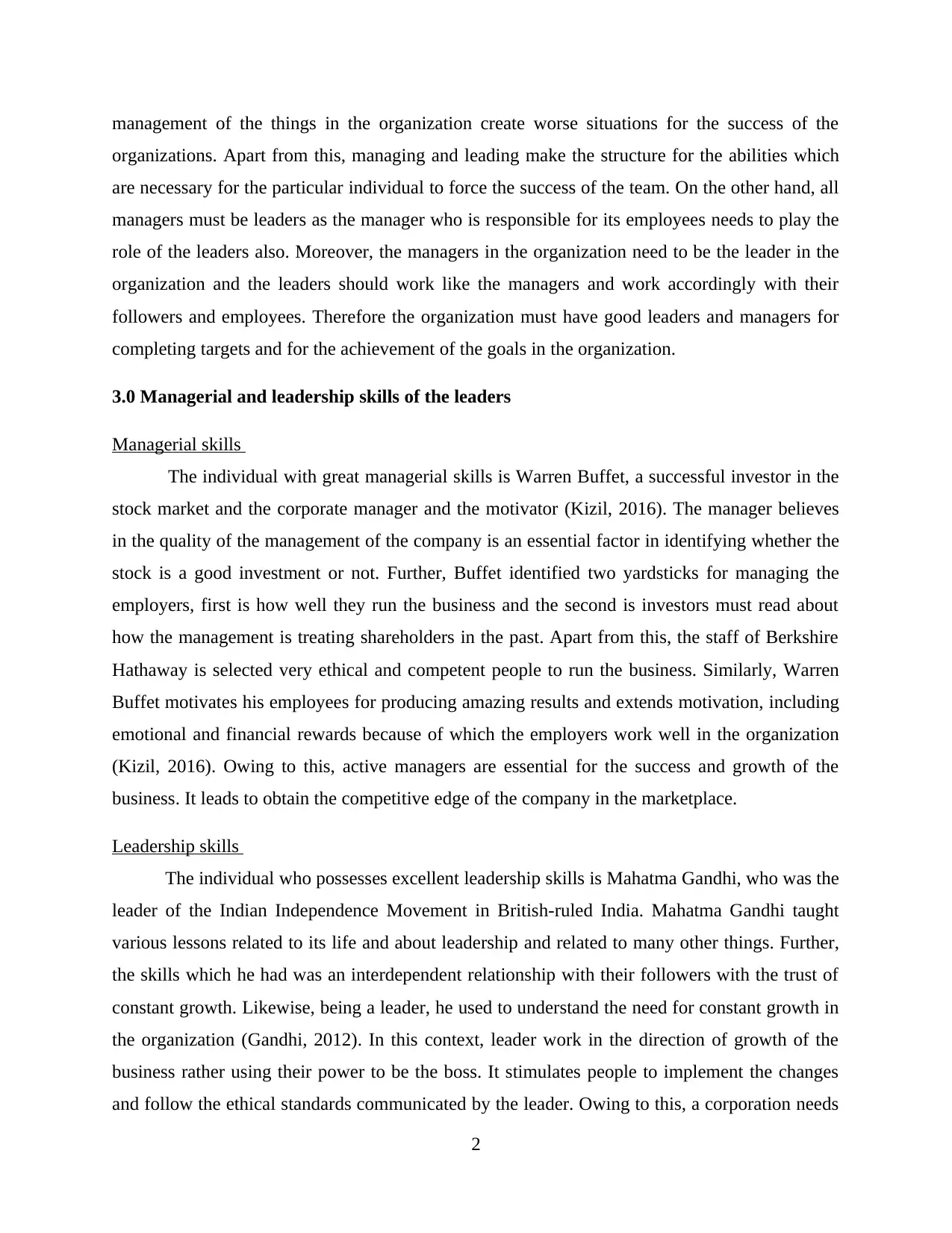
management of the things in the organization create worse situations for the success of the
organizations. Apart from this, managing and leading make the structure for the abilities which
are necessary for the particular individual to force the success of the team. On the other hand, all
managers must be leaders as the manager who is responsible for its employees needs to play the
role of the leaders also. Moreover, the managers in the organization need to be the leader in the
organization and the leaders should work like the managers and work accordingly with their
followers and employees. Therefore the organization must have good leaders and managers for
completing targets and for the achievement of the goals in the organization.
3.0 Managerial and leadership skills of the leaders
Managerial skills
The individual with great managerial skills is Warren Buffet, a successful investor in the
stock market and the corporate manager and the motivator (Kizil, 2016). The manager believes
in the quality of the management of the company is an essential factor in identifying whether the
stock is a good investment or not. Further, Buffet identified two yardsticks for managing the
employers, first is how well they run the business and the second is investors must read about
how the management is treating shareholders in the past. Apart from this, the staff of Berkshire
Hathaway is selected very ethical and competent people to run the business. Similarly, Warren
Buffet motivates his employees for producing amazing results and extends motivation, including
emotional and financial rewards because of which the employers work well in the organization
(Kizil, 2016). Owing to this, active managers are essential for the success and growth of the
business. It leads to obtain the competitive edge of the company in the marketplace.
Leadership skills
The individual who possesses excellent leadership skills is Mahatma Gandhi, who was the
leader of the Indian Independence Movement in British-ruled India. Mahatma Gandhi taught
various lessons related to its life and about leadership and related to many other things. Further,
the skills which he had was an interdependent relationship with their followers with the trust of
constant growth. Likewise, being a leader, he used to understand the need for constant growth in
the organization (Gandhi, 2012). In this context, leader work in the direction of growth of the
business rather using their power to be the boss. It stimulates people to implement the changes
and follow the ethical standards communicated by the leader. Owing to this, a corporation needs
2
organizations. Apart from this, managing and leading make the structure for the abilities which
are necessary for the particular individual to force the success of the team. On the other hand, all
managers must be leaders as the manager who is responsible for its employees needs to play the
role of the leaders also. Moreover, the managers in the organization need to be the leader in the
organization and the leaders should work like the managers and work accordingly with their
followers and employees. Therefore the organization must have good leaders and managers for
completing targets and for the achievement of the goals in the organization.
3.0 Managerial and leadership skills of the leaders
Managerial skills
The individual with great managerial skills is Warren Buffet, a successful investor in the
stock market and the corporate manager and the motivator (Kizil, 2016). The manager believes
in the quality of the management of the company is an essential factor in identifying whether the
stock is a good investment or not. Further, Buffet identified two yardsticks for managing the
employers, first is how well they run the business and the second is investors must read about
how the management is treating shareholders in the past. Apart from this, the staff of Berkshire
Hathaway is selected very ethical and competent people to run the business. Similarly, Warren
Buffet motivates his employees for producing amazing results and extends motivation, including
emotional and financial rewards because of which the employers work well in the organization
(Kizil, 2016). Owing to this, active managers are essential for the success and growth of the
business. It leads to obtain the competitive edge of the company in the marketplace.
Leadership skills
The individual who possesses excellent leadership skills is Mahatma Gandhi, who was the
leader of the Indian Independence Movement in British-ruled India. Mahatma Gandhi taught
various lessons related to its life and about leadership and related to many other things. Further,
the skills which he had was an interdependent relationship with their followers with the trust of
constant growth. Likewise, being a leader, he used to understand the need for constant growth in
the organization (Gandhi, 2012). In this context, leader work in the direction of growth of the
business rather using their power to be the boss. It stimulates people to implement the changes
and follow the ethical standards communicated by the leader. Owing to this, a corporation needs
2
Paraphrase This Document
Need a fresh take? Get an instant paraphrase of this document with our AI Paraphraser
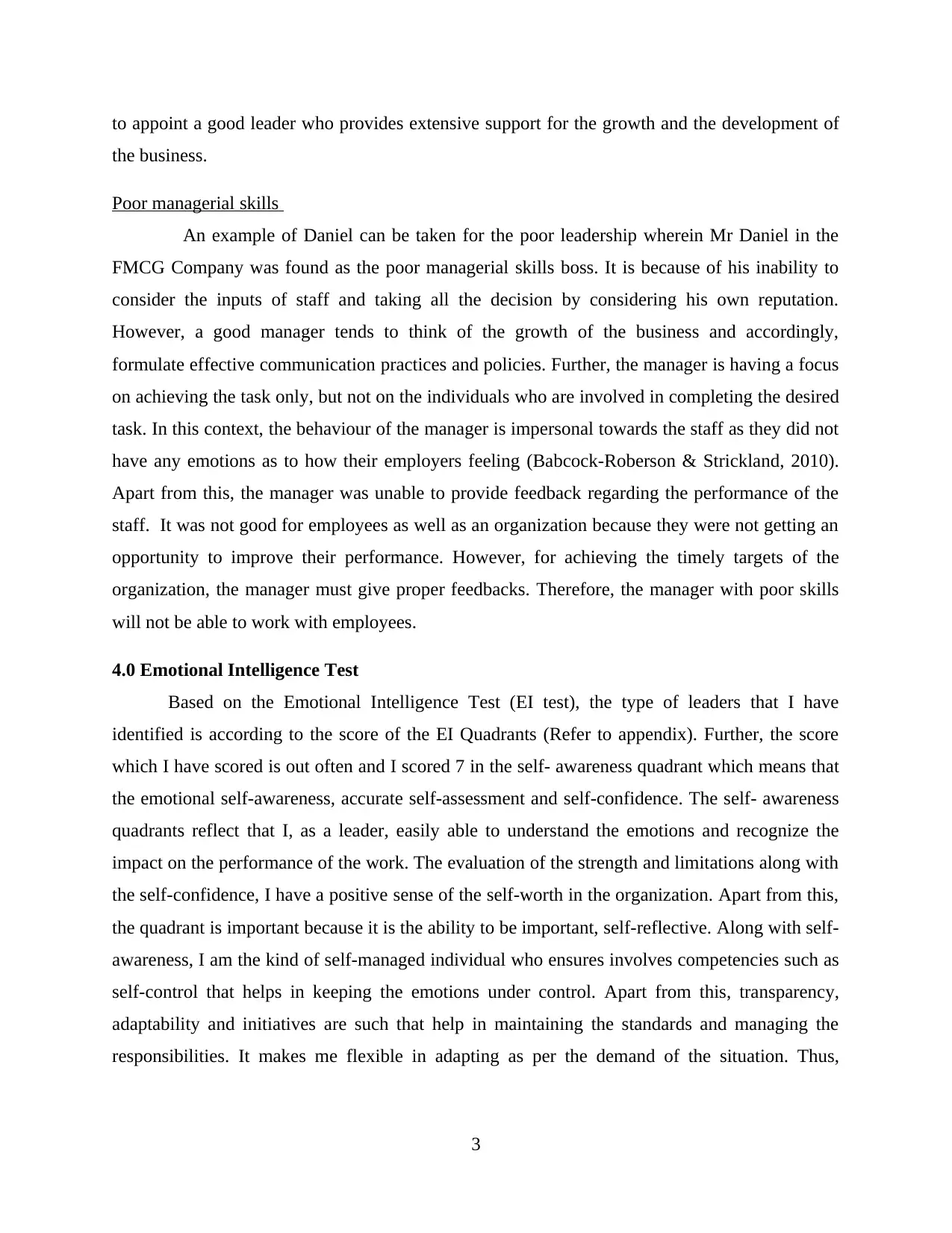
to appoint a good leader who provides extensive support for the growth and the development of
the business.
Poor managerial skills
An example of Daniel can be taken for the poor leadership wherein Mr Daniel in the
FMCG Company was found as the poor managerial skills boss. It is because of his inability to
consider the inputs of staff and taking all the decision by considering his own reputation.
However, a good manager tends to think of the growth of the business and accordingly,
formulate effective communication practices and policies. Further, the manager is having a focus
on achieving the task only, but not on the individuals who are involved in completing the desired
task. In this context, the behaviour of the manager is impersonal towards the staff as they did not
have any emotions as to how their employers feeling (Babcock-Roberson & Strickland, 2010).
Apart from this, the manager was unable to provide feedback regarding the performance of the
staff. It was not good for employees as well as an organization because they were not getting an
opportunity to improve their performance. However, for achieving the timely targets of the
organization, the manager must give proper feedbacks. Therefore, the manager with poor skills
will not be able to work with employees.
4.0 Emotional Intelligence Test
Based on the Emotional Intelligence Test (EI test), the type of leaders that I have
identified is according to the score of the EI Quadrants (Refer to appendix). Further, the score
which I have scored is out often and I scored 7 in the self- awareness quadrant which means that
the emotional self-awareness, accurate self-assessment and self-confidence. The self- awareness
quadrants reflect that I, as a leader, easily able to understand the emotions and recognize the
impact on the performance of the work. The evaluation of the strength and limitations along with
the self-confidence, I have a positive sense of the self-worth in the organization. Apart from this,
the quadrant is important because it is the ability to be important, self-reflective. Along with self-
awareness, I am the kind of self-managed individual who ensures involves competencies such as
self-control that helps in keeping the emotions under control. Apart from this, transparency,
adaptability and initiatives are such that help in maintaining the standards and managing the
responsibilities. It makes me flexible in adapting as per the demand of the situation. Thus,
3
the business.
Poor managerial skills
An example of Daniel can be taken for the poor leadership wherein Mr Daniel in the
FMCG Company was found as the poor managerial skills boss. It is because of his inability to
consider the inputs of staff and taking all the decision by considering his own reputation.
However, a good manager tends to think of the growth of the business and accordingly,
formulate effective communication practices and policies. Further, the manager is having a focus
on achieving the task only, but not on the individuals who are involved in completing the desired
task. In this context, the behaviour of the manager is impersonal towards the staff as they did not
have any emotions as to how their employers feeling (Babcock-Roberson & Strickland, 2010).
Apart from this, the manager was unable to provide feedback regarding the performance of the
staff. It was not good for employees as well as an organization because they were not getting an
opportunity to improve their performance. However, for achieving the timely targets of the
organization, the manager must give proper feedbacks. Therefore, the manager with poor skills
will not be able to work with employees.
4.0 Emotional Intelligence Test
Based on the Emotional Intelligence Test (EI test), the type of leaders that I have
identified is according to the score of the EI Quadrants (Refer to appendix). Further, the score
which I have scored is out often and I scored 7 in the self- awareness quadrant which means that
the emotional self-awareness, accurate self-assessment and self-confidence. The self- awareness
quadrants reflect that I, as a leader, easily able to understand the emotions and recognize the
impact on the performance of the work. The evaluation of the strength and limitations along with
the self-confidence, I have a positive sense of the self-worth in the organization. Apart from this,
the quadrant is important because it is the ability to be important, self-reflective. Along with self-
awareness, I am the kind of self-managed individual who ensures involves competencies such as
self-control that helps in keeping the emotions under control. Apart from this, transparency,
adaptability and initiatives are such that help in maintaining the standards and managing the
responsibilities. It makes me flexible in adapting as per the demand of the situation. Thus,
3
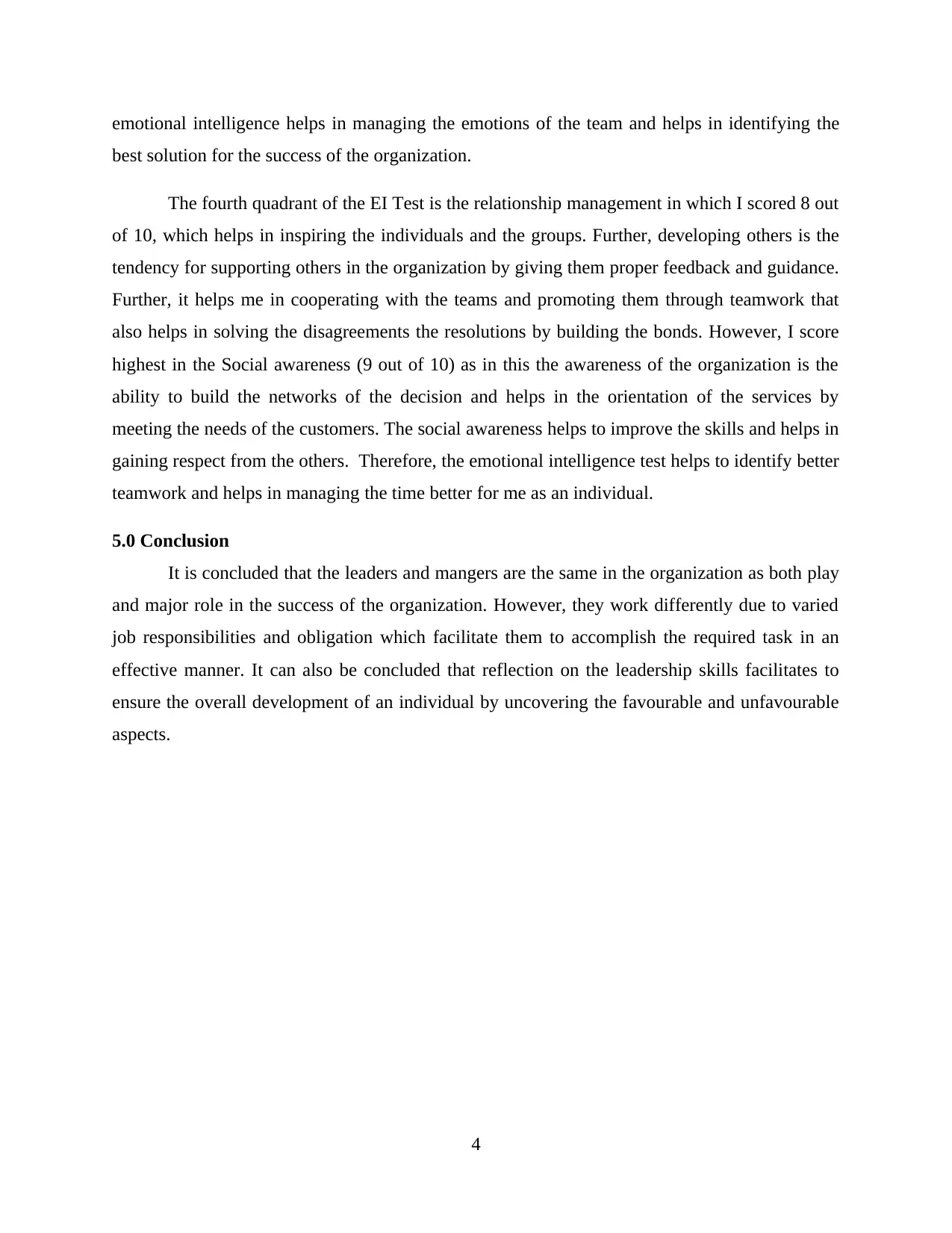
emotional intelligence helps in managing the emotions of the team and helps in identifying the
best solution for the success of the organization.
The fourth quadrant of the EI Test is the relationship management in which I scored 8 out
of 10, which helps in inspiring the individuals and the groups. Further, developing others is the
tendency for supporting others in the organization by giving them proper feedback and guidance.
Further, it helps me in cooperating with the teams and promoting them through teamwork that
also helps in solving the disagreements the resolutions by building the bonds. However, I score
highest in the Social awareness (9 out of 10) as in this the awareness of the organization is the
ability to build the networks of the decision and helps in the orientation of the services by
meeting the needs of the customers. The social awareness helps to improve the skills and helps in
gaining respect from the others. Therefore, the emotional intelligence test helps to identify better
teamwork and helps in managing the time better for me as an individual.
5.0 Conclusion
It is concluded that the leaders and mangers are the same in the organization as both play
and major role in the success of the organization. However, they work differently due to varied
job responsibilities and obligation which facilitate them to accomplish the required task in an
effective manner. It can also be concluded that reflection on the leadership skills facilitates to
ensure the overall development of an individual by uncovering the favourable and unfavourable
aspects.
4
best solution for the success of the organization.
The fourth quadrant of the EI Test is the relationship management in which I scored 8 out
of 10, which helps in inspiring the individuals and the groups. Further, developing others is the
tendency for supporting others in the organization by giving them proper feedback and guidance.
Further, it helps me in cooperating with the teams and promoting them through teamwork that
also helps in solving the disagreements the resolutions by building the bonds. However, I score
highest in the Social awareness (9 out of 10) as in this the awareness of the organization is the
ability to build the networks of the decision and helps in the orientation of the services by
meeting the needs of the customers. The social awareness helps to improve the skills and helps in
gaining respect from the others. Therefore, the emotional intelligence test helps to identify better
teamwork and helps in managing the time better for me as an individual.
5.0 Conclusion
It is concluded that the leaders and mangers are the same in the organization as both play
and major role in the success of the organization. However, they work differently due to varied
job responsibilities and obligation which facilitate them to accomplish the required task in an
effective manner. It can also be concluded that reflection on the leadership skills facilitates to
ensure the overall development of an individual by uncovering the favourable and unfavourable
aspects.
4
⊘ This is a preview!⊘
Do you want full access?
Subscribe today to unlock all pages.

Trusted by 1+ million students worldwide
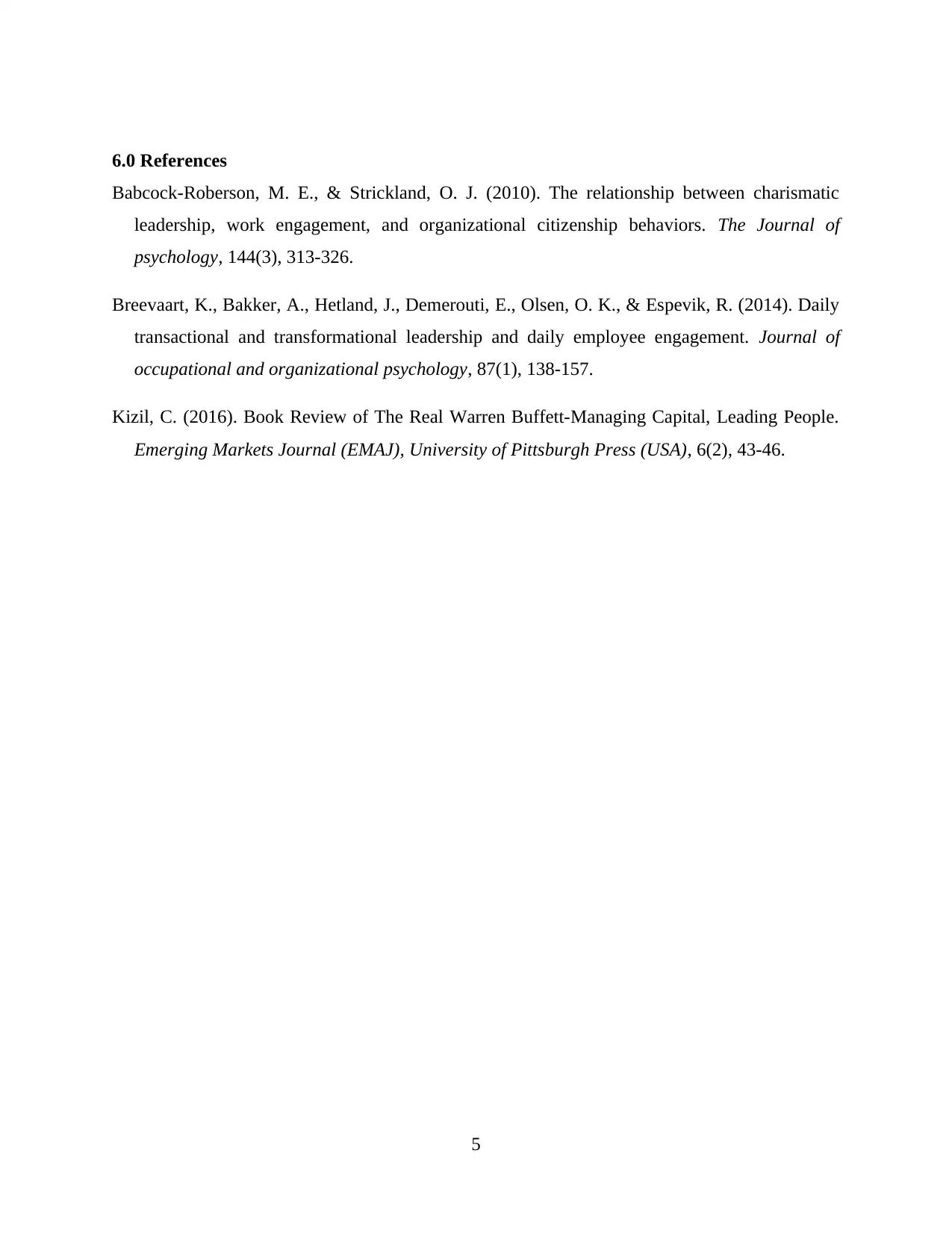
6.0 References
Babcock-Roberson, M. E., & Strickland, O. J. (2010). The relationship between charismatic
leadership, work engagement, and organizational citizenship behaviors. The Journal of
psychology, 144(3), 313-326.
Breevaart, K., Bakker, A., Hetland, J., Demerouti, E., Olsen, O. K., & Espevik, R. (2014). Daily
transactional and transformational leadership and daily employee engagement. Journal of
occupational and organizational psychology, 87(1), 138-157.
Kizil, C. (2016). Book Review of The Real Warren Buffett-Managing Capital, Leading People.
Emerging Markets Journal (EMAJ), University of Pittsburgh Press (USA), 6(2), 43-46.
5
Babcock-Roberson, M. E., & Strickland, O. J. (2010). The relationship between charismatic
leadership, work engagement, and organizational citizenship behaviors. The Journal of
psychology, 144(3), 313-326.
Breevaart, K., Bakker, A., Hetland, J., Demerouti, E., Olsen, O. K., & Espevik, R. (2014). Daily
transactional and transformational leadership and daily employee engagement. Journal of
occupational and organizational psychology, 87(1), 138-157.
Kizil, C. (2016). Book Review of The Real Warren Buffett-Managing Capital, Leading People.
Emerging Markets Journal (EMAJ), University of Pittsburgh Press (USA), 6(2), 43-46.
5
Paraphrase This Document
Need a fresh take? Get an instant paraphrase of this document with our AI Paraphraser
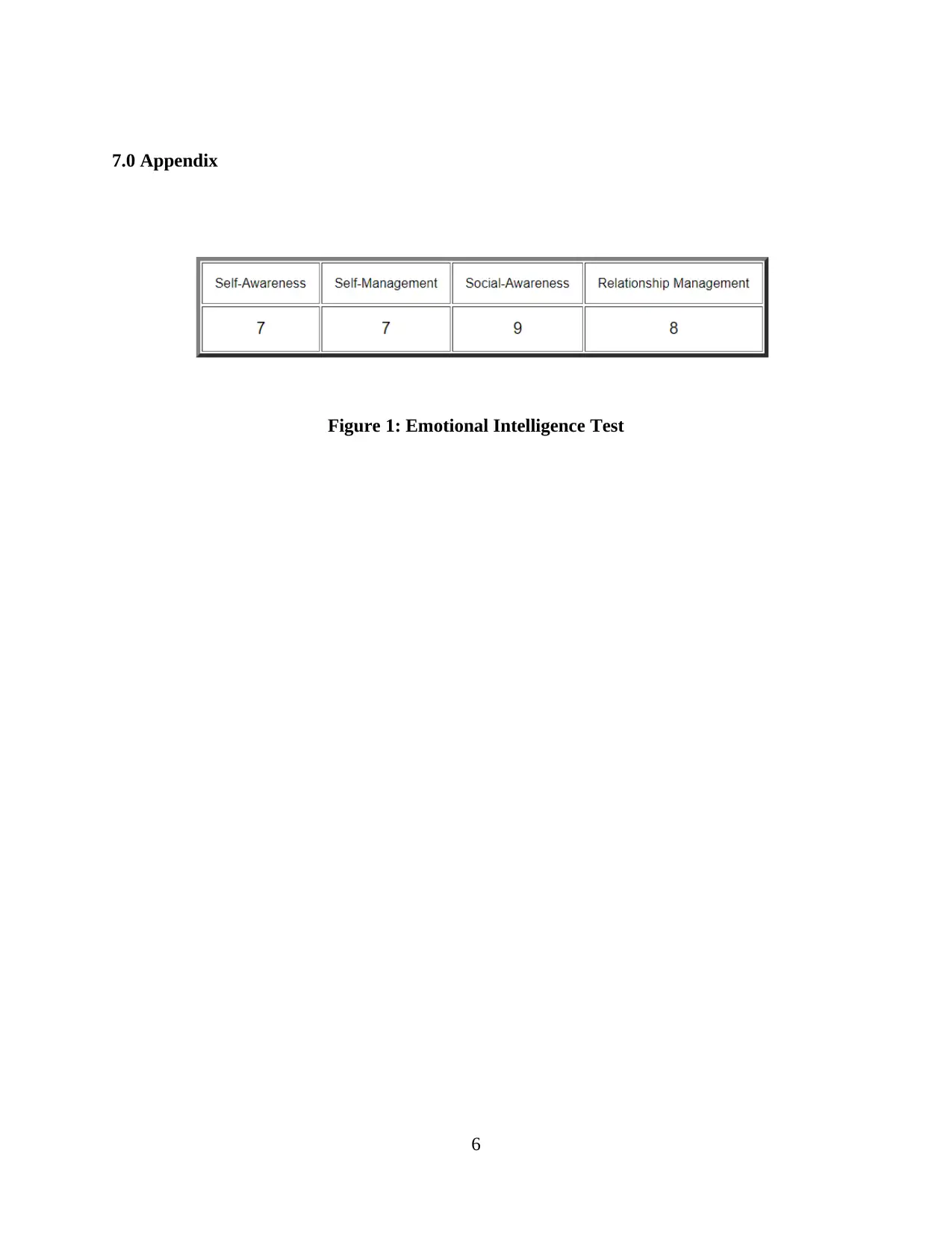
7.0 Appendix
Figure 1: Emotional Intelligence Test
6
Figure 1: Emotional Intelligence Test
6
1 out of 8
Related Documents
Your All-in-One AI-Powered Toolkit for Academic Success.
+13062052269
info@desklib.com
Available 24*7 on WhatsApp / Email
![[object Object]](/_next/static/media/star-bottom.7253800d.svg)
Unlock your academic potential
Copyright © 2020–2026 A2Z Services. All Rights Reserved. Developed and managed by ZUCOL.




